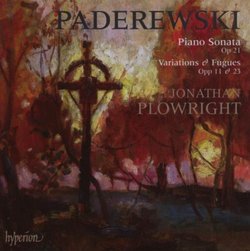The "Lion of Paris" Can Compose
Hexameron | 10/26/2007
(5 out of 5 stars)
"Any student of the piano or neophyte of piano recordings probably knows the name Ignacy Jan Paderewski. He was a brilliant virtuoso, a prime minister, and a composer of works other than the Minuet in G. Despite all the legendary anecdotes about his personality, virtuosity and the colorful characters that surrounded his long life, I've not encountered much writings or discussions about Paderewski's compositions. The popularity of his Minuet in G is really a travesty because it obscures some fantastic and perfectly valid compositions that are thrilling to hear. The Piano Concerto has been rightfully championed but what about Paderewski's other 35+ published works? Adam Wodnicki can be credited for traversing and recording most of Paderewski's piano pieces, but Hyperion and Jonathan Plowright have contributed further. The result is a recording that, I think, showcases Paderewski's best piano works, if not his best compositions altogether.
Consider the epic, hot-blooded, lyrical and totally original Piano Sonata in E flat minor. The musicologist and composer Daniel Gregory Mason referred to the work as simply being "Wagnerian," and that's a compliment. The first movement unfolds beautifully and heroically with a captivating theme and a succession of rich melodic ideas. The recapitulation is explosive, but Plowright's musicality rather than technical splendor is what shines. The liner-notes writer describes the second movement as referencing Tristan und Isolde, but Paderewski has plenty of his own idiomatic and original ideas. The third movement, however, is the magnificent crown. William Newman believes it "shows the devoted composer's noble command of the keyboard and his superior craftsmanship at their best." Indeed, it is a mesmerizing tour-de-force with a formal scheme that alternates between toccata and fugue. The Romanticism of Liszt and the Classicism of Brahms seem to merge here.
Paderewski's earlier Variations and Fugue Op. 11 is quite Chopinesque in melodic and rhythmic style. There are fourteen short variations bringing the total time of the performance to about fifteen minutes. This work is predominantly soothing and wholly charming. Underneath and surrounding some of the graceful variations, however, are ideas of outstanding imagination. Beginning with the eleventh variation marked "Andante misterioso" the entire composition takes a serious turn. The rip-roaring glissandi of the "Con fuoco" variation recalls Liszt, and the Fugue is the longest escapade (a little under four minutes), containing such a memorable fugue subject that I had the urge to teach myself to play it on the piano.
If the Op. 11 reveals an elegant and conservative side of Paderewski, then the mature Op. 23 unveils the profound and experimental side of him. The theme is more intellectual and the variations are far more diverse than in the Op. 11. The sublime realm conjured up by the sixth variation, the pathos of the ninth, the majestic tenth, and the experimental Scriabinesque fifteenth: these kinds of variations really make the Op. 23 an exceptional work. The last variation is heaven-storming and leads right into the sprawling eight minute Fugue which reaches a plane of grandeur and arresting beauty I didn't expect could come from a virtuoso-pianist. Besides Paderewki's talent, I'm quite sure Plowright's polished and passionate execution is partly responsible for making this such a powerful aural experience. He is one of Hyperion's finest and under-recorded musicians who tackles the unknown repertoire, and his projection of Paderewski's music is spellbinding.
Bottom line: Paderewski was a competent pianist-composer who unfortunately did not have time to cultivate his compositional powers further. In 1903 he took a break from touring and worked on several compositions at his Swiss villa. Among the opera and symphony he fashioned here, he also produced the Piano Sonata Op. 21 and his Op. 23 Variations. The quality of music content, the variety of expressions and sheer invention makes these two works substantial to the piano repertoire. While these have been recorded before, I think Plowright's interpretations are of the highest class. Let's forget the Minuet in G and remember "Paddy" (as the Americans called him) for these excellent pieces."


 Track Listings (41) - Disc #1
Track Listings (41) - Disc #1